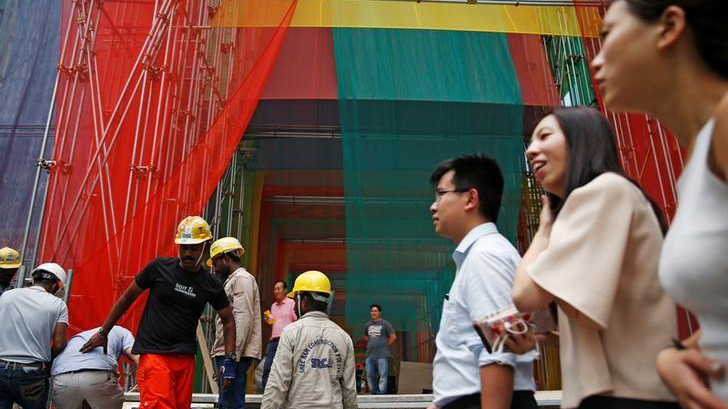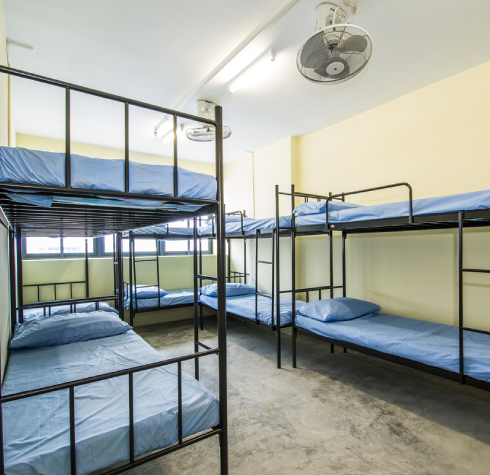
As the global spread of the novel coronavirus intensifies, with countries going on lockdown and governments issuing stop-work orders, temporary migrant workers are bearing the brunt of it – with little choice between protecting themselves from the virus and earning a living.
Of the 164 million migrant workers around the world, 42 million work in labor-intensive jobs such as construction, farming and services. Many live in cramped conditions, which are perfect breeding grounds for viruses.
"Workers are more afraid of the financial disaster than they are of the virus... They don't worry so much about falling sick, but they worry about being unable to work, no income and possibly cancellation of their work permits," said Alex Au, vice-president of Transient Workers Count Too (TWC2), a pro-migrant worker non-profit organization in Singapore.
Cramped dormitories – petri dish for viruses
TWC2 observed that a typical workers' dormitory in Singapore has between 12 and 20 people in a room with double-decker beds. These rooms sometimes only have a single window.
Official guidelines dictate each occupant should have a 4.4-square-meter area. These also include shared toilets, washing facilities and common areas.
"So, in effect, the ratio in the sleeping area is probably more like one worker per 2.5 square meters," Au explained to CGTN Digital. That is just a little more than a single-sized bed.
Social distancing has been touted as the most effective way to prevent the spread of viruses. While this may be possible to a certain extent at work sites, the real test comes when migrant workers return to their dormitories at the end of the day.
In Singapore, at least five clusters of the coronavirus were traced back to these workers' dormitories, a construction site, and a shipyard.
Of the city state's more than 1,000 cases, some of 130 reported were Bangladeshi, Indian and Myanmar nationals working in the country, according to the Health Ministry. That's a little over ten percent of total cases.
Authorities have appealed to dormitory operators to step up epidemic prevention efforts or face legal consequences.
Kong Chee Min, chief executive of Centurion Cooperation, which manages Westlite Papan, a dormitory operator with five compounds and 28,000 beds for foreign workers, said, "They have been preparing us ahead of time, so it helps us in terms of planning, including catering of food, delivering it to the workers, having Wi-Fi in the rooms, and managing the flow of workers, so that they are not always being cooped up in the rooms," reported the Straits Times.

Westlite Toh Guan dorm room. /Screenshot from website
Westlite Toh Guan dorm room. /Screenshot from website
But Au remains skeptical.
"How do we ask workers to go into 'self-isolation' when their normal living conditions are to share a room with 12-20 other people?" he questioned.
'Home is not an option'
For many temporary workers in Asia from Bangladesh, India, Nepal and Myanmar working in other cities, home is not an option.
In Bangladesh, close to six percent of its GDP is from overseas remittance compared to the world's average of 0.8 percent, according to the World Bank. In Nepal, that number is a staggering 29 percent.
In their search for work, they wind up at construction sites in Singapore, Middle East, palm plantations in Malaysia, or as low-wage laborers in India. To get to the destination country to begin with, some have had to pay recruitment costs, which are at times 10 to 20 times their monthly salary.
"Many of them are low-wage workers. They have no savings. It's a financial disaster for them to be unable to work for a few weeks. It's equally a financial disaster to be laid off (even when healthy) because the company is suffering poor business," explained Au.
Even if they were able to return home, governments have urged workers abroad not to, saying the healthcare system will not be able to cope if they bring the coronavirus back home.
Ridwan Kamil, the governor of West Java, Indonesia, has called on the Indonesian Ulema Council (MUI) to issue a fatwa declaring that participating in an exodus during a pandemic is haram, reported the Jakarta Post. He said: "Mudik [the act of returning to hometowns or villages] is going to worsen our situation. Please stay where you are for the time being."
Migrant workers from Myanmar have also been urged not to return home.
Planning for the future
The UN's International Labor Organization said in March that some 25 million jobs may be lost due to the coronavirus outbreak, and migrant workers are likely to be disproportionately affected; further exacerbating inequality between the world's richest and poorest.
"The strain on incomes resulting from the decline in economic activity will devastate workers close to or below the poverty line," the UN agency said in a report, calling for urgent, large-scale and coordinated measures to protect workers in the workplace.
Singapore has hired 331,100 foreign migrant workers in its construction sector as of June 2019, according to the Manpower Ministry. On Friday, it announced that non-essential work will be suspended for a month starting on Tuesday, including work at construction sites.
The Manpower Ministry has taken steps to allow foreign workers to move between sectors to help protect jobs and manage manpower needs in the country, measures set to be in place until the end of August.
The move will allow work permit holders to continue having a source of income should their sector be affected by the coronavirus.
The current situation is still rife with uncertainty as confirmed COVID-19 cases rise with no sign of stopping. There are currently more than 1.2 million confirmed cases of coronavirus worldwide, and more than 64,000 deaths.
This will unlikely be the last pandemic the world sees, and countries with a huge number of temporary migrant workers will need to think of long term strategies to protect vulnerable workers before the next one hits.
(Cover image: Office workers pass construction workers in the central business district in Singapore, September 21, 2016. /Reuters)